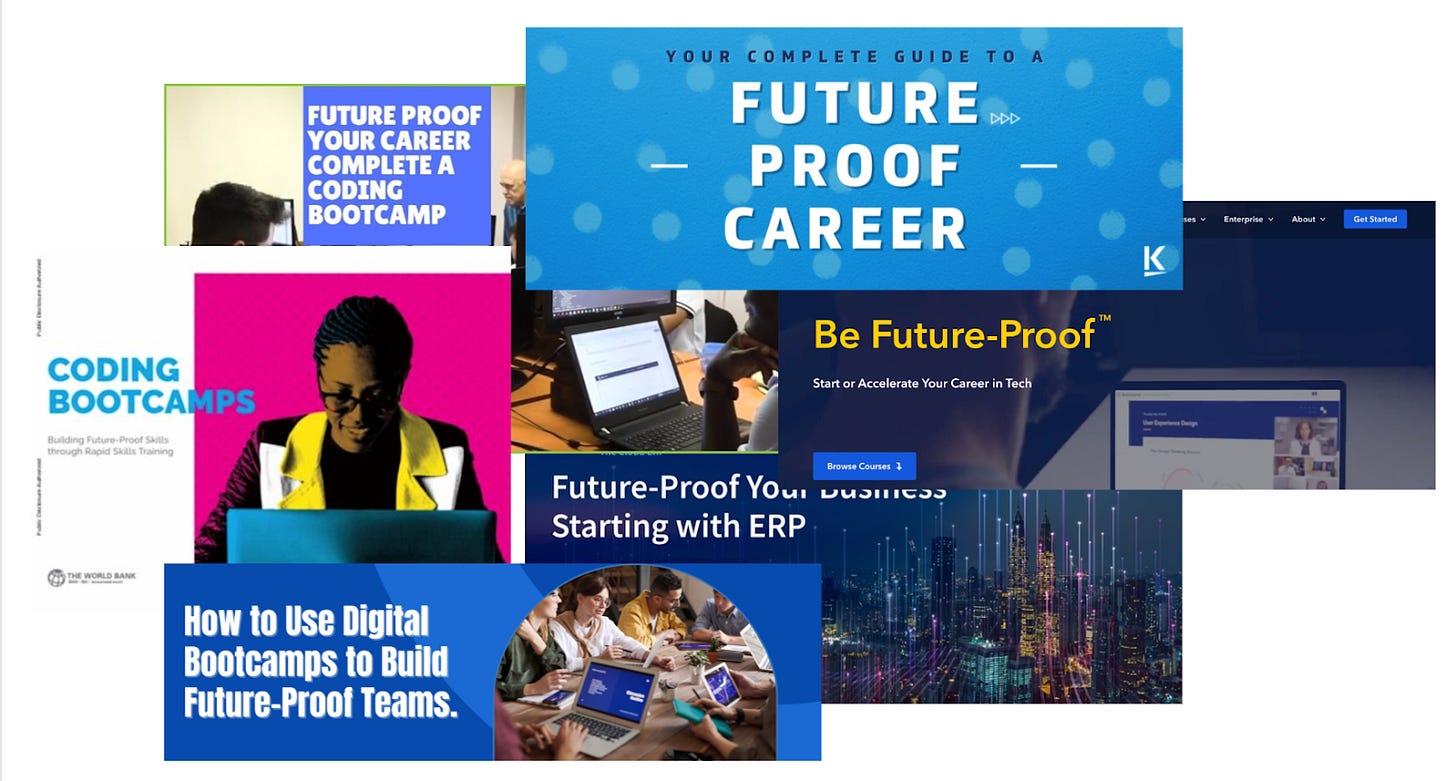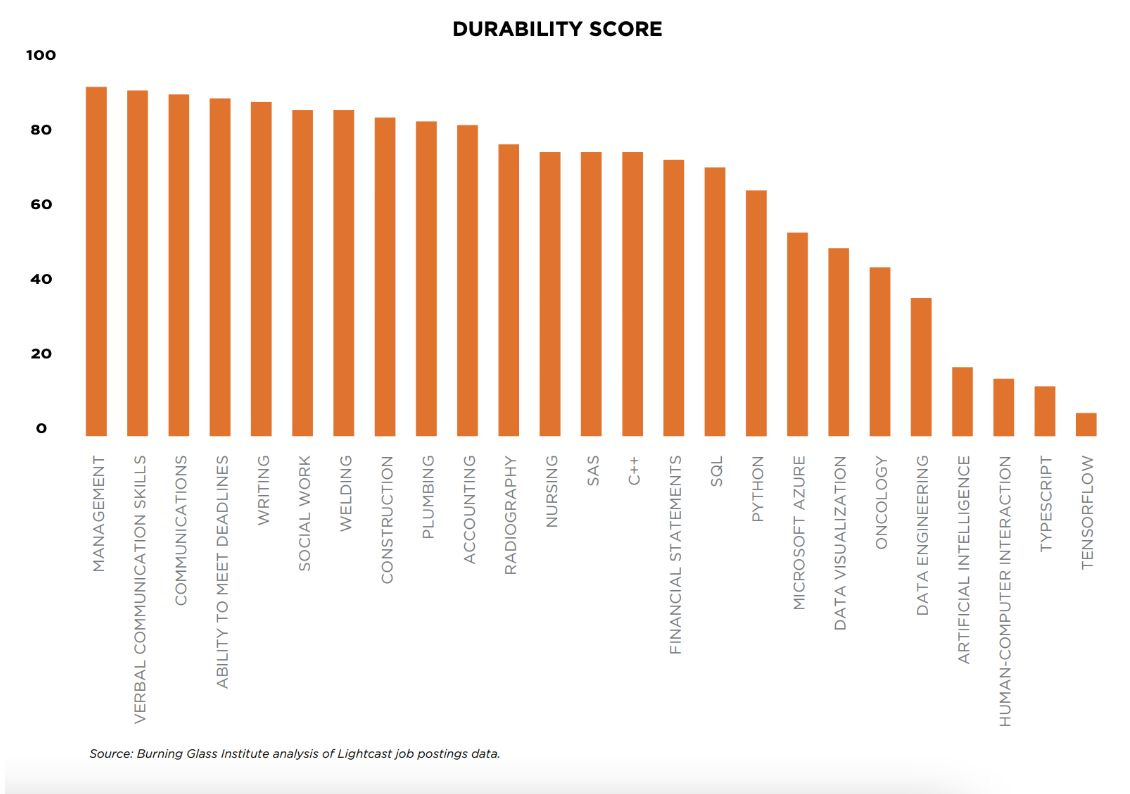Greetings, happy new year (it’s definitely too late to keep saying that). This week I’m looking at a warning sign for software development bootcamps. Next week or the week after, I’ll update the bootcamp universe map from last year. And look at just how many tech jobs there are in the UK. Onwards.
If you run a software development bootcamp, a recent Burning Glass institute report should keep you awake at night.
The report, titled How Skills Are Disrupting Work, looks at a decade of labor market analysis and identifies how digital skill training and credentials have responded to new jobs.
Three trends stuck out to me:
The most future-proof skills aren't technical
Demand for software development is in decline
One in eight postings feature just four skill sets
These three trends should sound a warning for software development bootcamps, in particular. Let's see why, and how you can prepare to face the coming challenges.
The most future-proof skills aren’t technical
Having a "future-proof" career sounds quite lovely. No robots are coming to replace you, no sir.
And getting trained to be "future proof" is a popular claim, lots of education companies claim their courses help you be "future-proof."
But if your bootcamp claims to be "future proof" – and the more I write those two words, the less meaning they seem to have – be careful. It turns out technical skills aren’t as long-lasting as you might think.
According to a recent The Burning Glass Institute report, tech skills are among the least "future proof" for your career. Strong, soft skills (management, writing, hitting deadlines) are more critical (and durable).
According to the report, many foundational skills have high durability. Once you have these skills, you are less likely to need to update your know-how to stay competitive.
By contrast, many emerging skills have low durability. For example, TensorFlow – a popular Deep Learning tool in Machine Learning – has a low durability score, meaning workers likely need to upskill often to be relevant.
Overall, a lot of technical skills relate to programs or apps that can have a relatively short lifespan. The technology is often quickly superseded by a new or more versatile replacement.
For example, most software development bootcamps taught Ruby on Rails between 2012 and 2015, before it was replaced by JavaScript around 2016. In 2023, Python is slowly increasing in popularity as bootcamps add more data-focused curriculum. The technology taught by last-mile providers is constantly changing.
The chart above shows how decisions on programming language can impact a bootcamp's durability. C++ (a legacy enterprise programming language) is still remarkably durable. Bootcamps that teach C++ are rarer, partly because it has a higher barrier to entry, with more computer science fundamentals needed to be effective in the workplace.
Bootcamps that focus on front-end frameworks will have to replace their curricula every 4-5 years. Those focused on legacy programming languages are more durable.
Key takeaway. Bootcamp graduates that focus on less durable skills need upskilling every 3-5 years. Graduates with durable skills are more likely to advance quickly into managerial / lead positions.
Demand for software development is in decline
Software development jobs increased by 44% from 2012-2017. But hiring has stalled in recent years, as the role has become a far less skill-rich occupation. According to Burning Glass, demand for jobs in web development is below pre-2019 levels, with the market for web developers also declining.
Low-code or no-code tech is now widespread. Think Canva, Wix, or Squarespace. The barrier to entry for creating simple web apps now enables thousands of former clients to do the work themselves – work they would have employed a developer to do in the past.
ChatGPT will further speed up this decline. Though we're still super early in development here, using AI as a co-pilot already allows new developers to spin up complex web apps with no technical knowledge.
For bootcamps still focused on software development, this should be a cautionary tale.
A recent report from CompTIA showed that 30% of all tech jobs postings are for positions in emerging technologies, such as artificial intelligence, or in roles requiring emerging tech skills.
Bootcamps should be creating pathways for developers into these new, emerging pathways. It’s about providing people with a pathway to transition their skills towards growing skill-sets.
For example, Burning Glass shows a Web Developer has a lot of skill overlap with a Network Engineer – a core job in the Cloud skill area. You can see the opportunities this creates. To create pathways from roles with declining prospects to ones with a lot of promise.
In the UK and the US, data is publicly available on the Bureau for Labor Statistics and the Office for National Statistics for the jobs most at risk of automation or which are in decline.
Key takeaway: Last-mile training providers should look to develop pathways from jobs in decline to jobs with emerging growth prospects.
Four skill sets define the landscape
The same report also revealed one in eight postings feature just four skill sets. These high-demand skills should fuel the next stage of bootcamp growth.
The four skills in question are:
Artificial Intelligence/Machine Learning
Cloud Computing
Social Media
Product Management
These four skills are among the fastest growing outside the tech industry. Job ads in FAANG and Microsoft companies have declined 74% since September 2021. But this cluster of four skills now feature in one in five manufacturing jobs and one in four utilities jobs. In some sectors, skills from these sets feature in up to a third of all job postings.
The five-year growth rate for these four skill sets was 122% in 2021, compared with a 10% growth rate for the average skill over the same period.
And this change is happening rapidly, in a decade rather than the lifetime of an average worker. On average, 37% of the top 20 skills requested for the average U.S. job have changed since 2016.
Bootcamps, universities, and other education providers should all look at how they can take advantage of this shift. No one provider has claimed the market for these four skills. The Burning Glass data indicates demand from employers is there. But the pathways to teach these skills and connect graduates with local employers is unclear.
Key takeaway: Four skill sets seem to define the landscape. All four are set to be needed across job roles and industries in the next five years. It’s an unclaimed market from the educator’s point of view.
What next?
Many of these roles need a college degree. For example, bachelor's degrees are still a powerful credential for AI/ML and Social Media.
But workers can land these roles without tons of experience.
Bootcamps and last-mile providers have an opportunity to create programs in emerging skills – not necessarily as an alternative to university, but in partnership with higher education.
Building such programs requires careful tracking of developments in the labor market. According to Joe Mitchell, the COO of Skillstorm, colleges and last-mile providers can work together to create these pathways, and share insights to increase their predictive capacity to anticipate skills evolutions.
And they need to move fast. The decline of web development illustrates how today's in-demand skill sets will go.
This year I’ve started to take on ghostwriting clients. I have an open slot for Founders or CEOs who need a collaborator to help them create content. Do you have a lot of ideas but struggle to find the time to write? Perhaps I can help. Details about the process and rates are here. - G










Excellent as always Gordon. This "pathways" concept is a new line of thinking (maybe 3-5) and its quite powerful.
I would love your take on the following 2 points getting connected to this thought process:
1. Return on Investment (RoI) for each pathway. The data being available to make decisions regarding this.
2. All pathways are time bound. The length of time might vary but there is a time associated with each pathway. What might be constant would be the process and maybe "skills" required for each transition from one pathway to another.